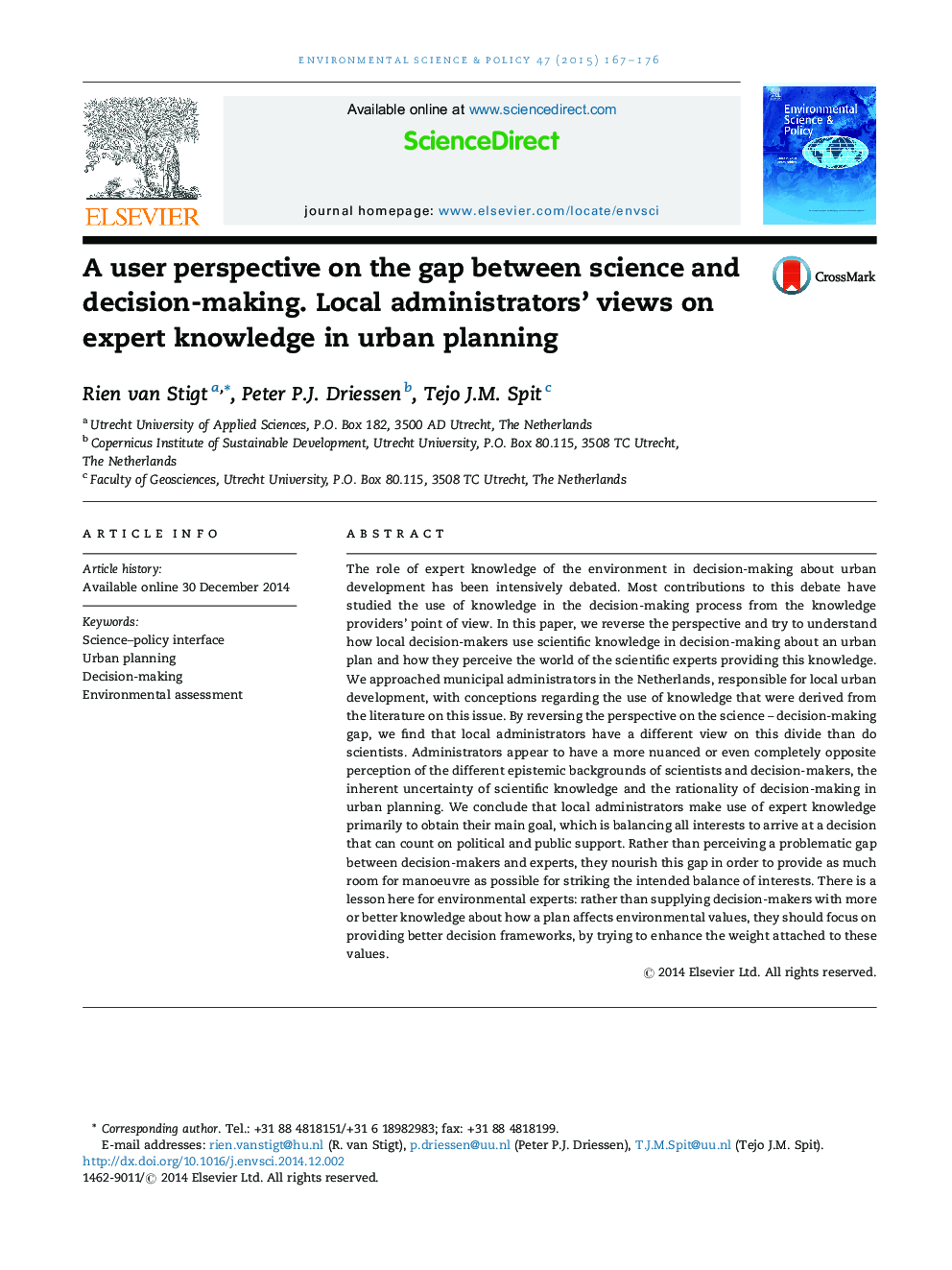| کد مقاله | کد نشریه | سال انتشار | مقاله انگلیسی | نسخه تمام متن |
|---|---|---|---|---|
| 7467603 | 1485059 | 2015 | 10 صفحه PDF | دانلود رایگان |
عنوان انگلیسی مقاله ISI
A user perspective on the gap between science and decision-making. Local administrators' views on expert knowledge in urban planning
ترجمه فارسی عنوان
چشم انداز کاربر در شکاف بین علم و تصمیم گیری. دیدگاه مدیران محلی در مورد دانش تخصصی در برنامه ریزی شهری
دانلود مقاله + سفارش ترجمه
دانلود مقاله ISI انگلیسی
رایگان برای ایرانیان
کلمات کلیدی
علم سیاست رابط، برنامه ریزی شهری، تصمیم سازی، ارزیابی زیست محیطی،
ترجمه چکیده
نقش دانش تخصصی در محیط زیست در تصمیم گیری در مورد توسعه شهری به شدت مورد بحث قرار گرفته است. بیشترین مشارکت در این بحث، استفاده از دانش در فرآیند تصمیم گیری را از نقطه نظر ارائه دهندگان دانش مورد مطالعه قرار داده است. در این مقاله چشم انداز را تغییر داده و سعی می کنیم درک کنیم که چگونه تصمیم گیرندگان محلی از تصمیم علمی در مورد برنامه شهری استفاده می کنند و چگونه دنیایی از کارشناسان علمی را که این دانش را درک می کنند، استفاده می کنند. ما به مدیران شهری در هلند، مسئول توسعه شهری محلی، با مفاهیم مربوط به استفاده از دانش که از ادبیات در این زمینه مشتق شده بود، رسیدیم. با تغییر دیدگاه علمی - شکاف تصمیم گیری، متوجه می شویم که مدیران محلی دیدگاه های متفاوت در مورد این تقسیم را نسبت به دانشمندان دارند. به نظر می رسد که مدیران دارای درک متمایز تر و یا کاملا کاملا متضاد از زمینه های معرفت شناختی مختلف دانشمندان و تصمیم گیران، عدم قطعیت ذاتی دانش علمی و عقلانیت تصمیم گیری در برنامه ریزی شهری هستند. ما نتیجه می گیریم که مدیران محلی به طور عمده از دانش تخصصی استفاده می کنند تا هدف اصلی خود را بدست آورند، که منافع مشترک را برای به رسمیت شناختن تصمیم می گیرد که می تواند بر حمایت سیاسی و عمومی حساب کند. به جای درک شکاف مشکل بین تصمیم گیرندگان و کارشناسان، این شکاف را به وجود می آورند تا به اندازه کافی برای مانور دادن به منافع احتمالی فراهم شود. در اینجا برای متخصصان محیط زیست یک درس وجود دارد: به جای فراهم کردن تصمیم گیرندگان با دانش بیشتر یا بهتر در مورد چگونگی تاثیر گذاری بر ارزش های زیست محیطی، آنها باید با ارائه چارچوب تصمیم بهتر، با تلاش برای افزایش وزن وابسته به این ارزش ها تمرکز کنند.
موضوعات مرتبط
مهندسی و علوم پایه
مهندسی انرژی
انرژی های تجدید پذیر، توسعه پایدار و محیط زیست
چکیده انگلیسی
The role of expert knowledge of the environment in decision-making about urban development has been intensively debated. Most contributions to this debate have studied the use of knowledge in the decision-making process from the knowledge providers' point of view. In this paper, we reverse the perspective and try to understand how local decision-makers use scientific knowledge in decision-making about an urban plan and how they perceive the world of the scientific experts providing this knowledge. We approached municipal administrators in the Netherlands, responsible for local urban development, with conceptions regarding the use of knowledge that were derived from the literature on this issue. By reversing the perspective on the science - decision-making gap, we find that local administrators have a different view on this divide than do scientists. Administrators appear to have a more nuanced or even completely opposite perception of the different epistemic backgrounds of scientists and decision-makers, the inherent uncertainty of scientific knowledge and the rationality of decision-making in urban planning. We conclude that local administrators make use of expert knowledge primarily to obtain their main goal, which is balancing all interests to arrive at a decision that can count on political and public support. Rather than perceiving a problematic gap between decision-makers and experts, they nourish this gap in order to provide as much room for manoeuvre as possible for striking the intended balance of interests. There is a lesson here for environmental experts: rather than supplying decision-makers with more or better knowledge about how a plan affects environmental values, they should focus on providing better decision frameworks, by trying to enhance the weight attached to these values.
ناشر
Database: Elsevier - ScienceDirect (ساینس دایرکت)
Journal: Environmental Science & Policy - Volume 47, March 2015, Pages 167-176
Journal: Environmental Science & Policy - Volume 47, March 2015, Pages 167-176
نویسندگان
Rien van Stigt, Peter P.J. Driessen, Tejo J.M. Spit,
